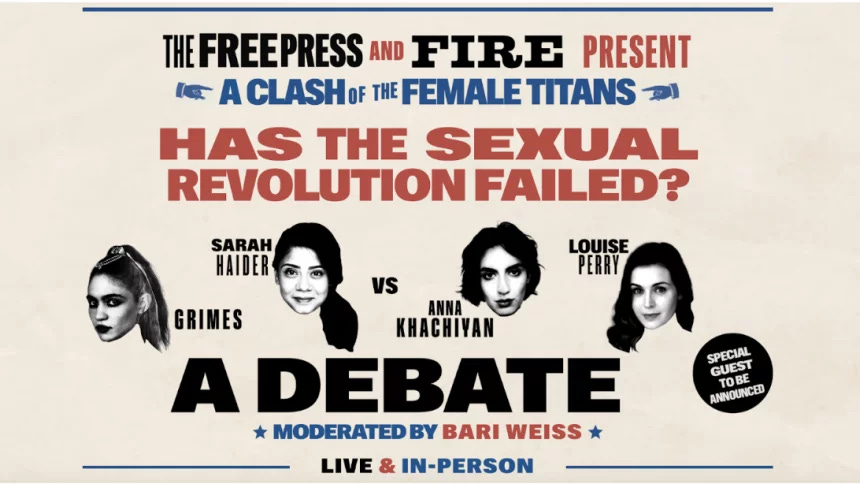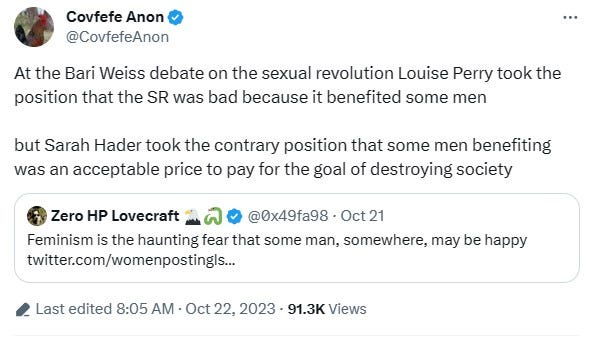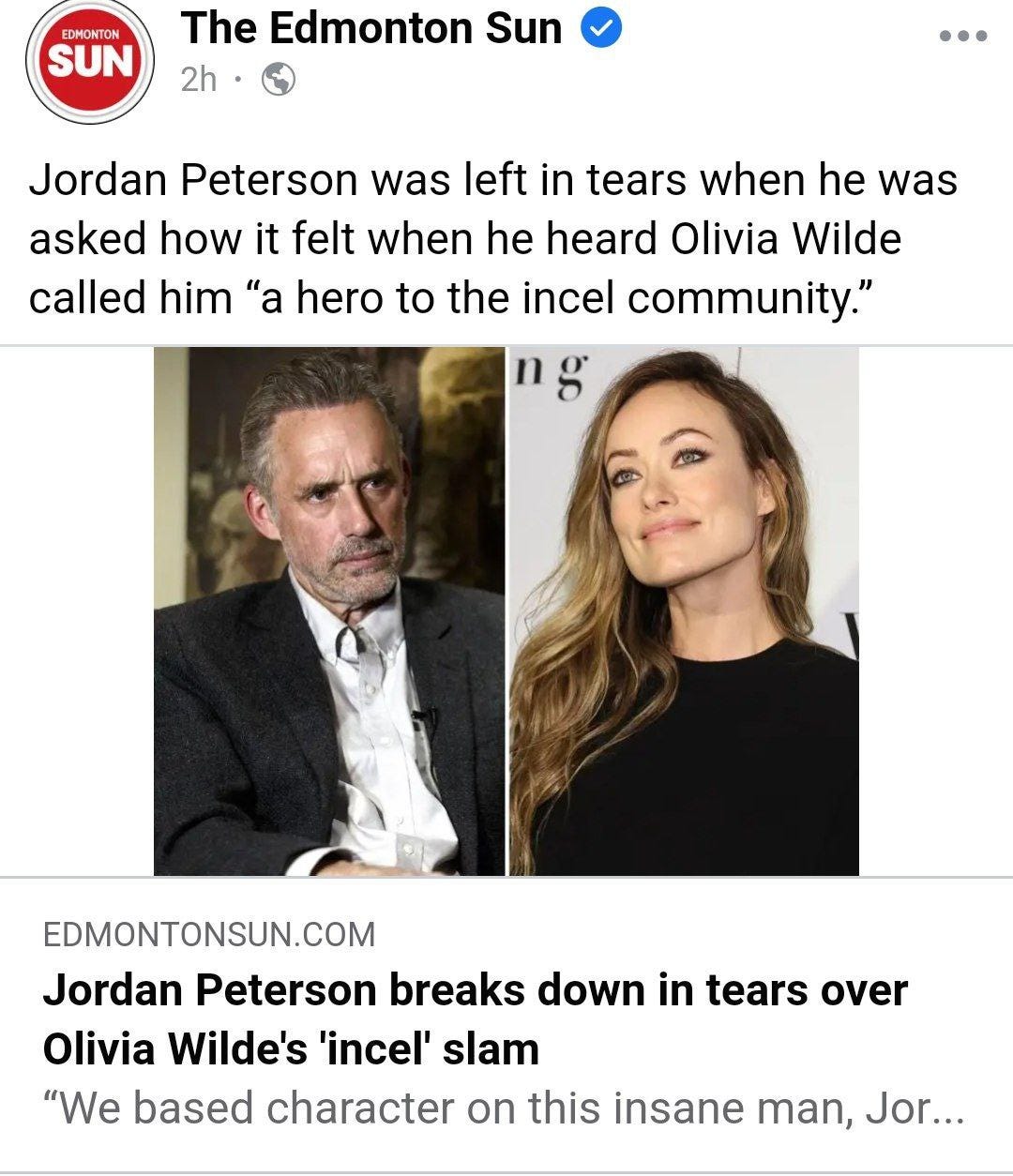Source: FIRE
“Has The Sexual Revolution Failed” was a live debate on September 13, at the Ace Theatre in Downtown LA. The debate was moderated by Bari Weiss, hosted by her company, The Free Press, and sponsored by the Foundation for Individual Rights and Expression (FIRE). Louise Perry, author of The Case Against the Sexual Revolution, and Anna Khachiyan, cultural critic and co-host of the Red Scare podcast, argued that the sexual revolution has failed. The opposing side, defending the sexual revolution, was represented by musician Grimes, and feminist ex-Muslim, Sarah Haider.
Author of the incelcore novel, Dragon Day, Matt Pegas, attended the event. His take was that “I'd say I was there more for social reasons, and it was cool to see such a massive audience in LA. Anna mentioned BAP and a huge chunk of the audience cheered like it was a baseball game, totally surreal. In terms of the actual debate, I'm not sure if it moved the needle one way or the other for me, but for someone who'd never really considered the potential negative side of the sexual revolution, I imagine they could have gleaned quite a bit from the points made by Anna K and Louise Perry.”
It is notable that the panel was all female, though Anna Khachiyan was the only speaker to bring up the negative impacts of the sexual revolution on men, including the incel issue. Anna K pointed out that men had only a few decades to enjoy the fruits of the sexual revolution until Title 9 and #metoo. Overall Anna was the most spot-on of the speakers.
In contrast with Anna’s Paglian take that women have agency, Louise Perry, who is also critical of the sexual revolution, takes the stance that women are the victims of the sexual revolution, thus granting agency to men over women. Perry feels strongly that hookup culture has made adolescent girls and young women vulnerable to abuse in relationships. For instance, being pressured into degrading, porn-like sexual acts. Even though women are generally sexual selectors, Perry makes the case that women need more social protections, in part, because they are much more agreeable, especially at a young age. Obviously both a lot of feminists and social conservatives view women as the weaker sex.
The Manosphere or incel response to Louise Perry’s argument would be that young women in bad relationships still have agency, and that by selecting guys who treat them poorly are incentivizing that behavior. Incels protest that society is returning to a more polygamous matting arrangement, as Tinder algorithms screw over the bottom 90% of guys, and social atomization and #metoo feminism makes it much tougher to date IRL. Not to mention that women’s’ dating standards have gone up due to online dating, social media, and economic independence, while women still expect men to provide an upper middle class lifestyle that is no longer attainable for most millennials and zoomers. While Perry agrees that the sexual revolution has incentivized for the worst male traits, she tends to view men as the winners of the sexual revolution, glossing over the sexual underclass. Perry’s main concern is that harems put women and children in danger, and overall create much more dangerous societies. You could describe Perry as a TERF, sex negative or conservative feminist, though she wrote an article on why feminists must reject both the left and right. Basically she wants to reshape society for the benefit of women, which would include clamping down on male sexuality.
Grimes, as a techno-optimist, views these negative social trends as a temporary or transitional stage, to what is hopefully a better future. Grimes believes that technology will solve a lot of social problems, such as artificial wombs solving low fertility rates. Plus she thinks that AI could help with childcare, and resolve sexual issues. She also sees the return to living with extended families as a return to more communal living, which will solve atomization once society adjusts. Overall I am skeptical of techno-optimism, as technological progress created a lot of these problems in the first place. However, there are trade-offs, as some social problems will get resolved while others may get much worse. As for the incel issue, technology (eg porn and now AI chatbot gfs) have placated a lot of male eroticized rage. Whether that is positive or negative is datable.
While it is intellectually shallow to blame one ideology or entity for all of society’s ills, what is broadly described as Liberalism or modernity is a convergence of various trends including social liberalism, feminism, atomization, consumerism, mass immigration, economic financialization, globalization, managerialism, and rapid technological change. The prophet of despair, Michel Houellebecq, in his novel, Whatever, said that “Just like unrestrained economic liberalism, and for similar reasons, sexual liberalism produces phenomena of absolute pauperization. Some men make love every day; others five or six times in their life, or never. Some make love with dozens of women; others with none. It's what's known as 'the law of the market'...Economic liberalism is an extension of the domain of the struggle, its extension to all ages and all classes of society. Sexual liberalism is likewise an extension of the domain of the struggle, its extension to all ages and all classes of society.”
Source: @CovfefeAnon
Basically there are winners and losers of the sexual revolution just as there are with economic neoliberalism. I think it was Anna who said that all of us on stage are winners of the sexual revolution. The sociosexual and economic winners and losers are often the same, though not in every case. While human nature is hierarchical, our society is producing way too many losers and maladjusted people, on top of zero-sum competition over a very limited number of spots at the top. The liberal meritocratic ideal that everyone is responsible for their own fate makes some sense in times of great prosperity, but is especially cruel to those who fail. Besides the incel issue, out of wedlock births have devastated the underclass, as the upper class has weathered the sexual revolution much better, something that Charles Murray commented on in his book, Coming Apart. Not to mention the growing number of childless middle aged women and dramatic rise in anti-depressant use among women.
Overall, I was the least impressed by what Sarah Haider had to say. Basically, Haider defended the status quo as great and just in comparison to how women were treated in the past. While she seems to lack empathy for those struggling socially, she is not inherently wrong in the context of her coming from a Muslim Pakistani background. In fact, she is someone who has thrived under liberalism, and would be much worse off if she had stayed in Pakistan. Certainly many people, of both genders, are thriving under the current system. Regardless, defending the status quo by saying things are great now, much like with politics and the economy, is bound to really piss people off.
source: EDMONTONSUN.com








It's much simpler than that. The reason men are struggling nowadays is because the sex ratio has gone up. There are now more single men than single women, creating more competition in getting women, which is a different from before. But you'll never hear anyone talk about this "elephant in the room." The reason the sex ratio has gone up is, first of all, men live longer than before, thanks to advances in medicine, healthier lifestyles, and the lack of wars. As recently as 20-30 years ago, a single man on a dating site had more options than now, because there were more simply more single women relative to the single male population than now. Also, the decrease in the divorce rate is keeping women married for a longer time than before. It's not surprising at all that Tinder or other dating sites are a sausage fest nowadays. In my 20s in the 2000s I still caught the tail end of the era when the sex ratio wasn't as prohibitively high as now, allowing men (even young men, but especially older men in their 30s/40s/50s) to have some chance of meeting women. That's all gone now. It's a very serious matter. That's why "incels" have become a new phenomenon.
great article, the one subset of population that seems to be over looked by the woman is the alpha widows to rode the cock carousel/sex and the city fairy tail until there mid thirties and then became bitter spinsters